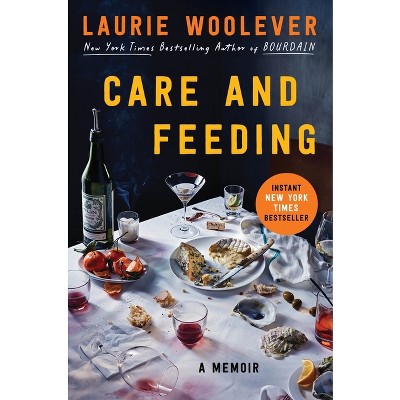Sponsored

A Body Made of Glass - by Caroline Crampton
In Stock
Sponsored
About this item
Highlights
- Part cultural history, part literary criticism, and part memoir, A Body Made of Glass is a definitive biography of hypochondria.Caroline Crampton's life was upended at the age of seventeen, when she was diagnosed with Hodgkin's lymphoma, a relatively rare blood cancer.
- Author(s): Caroline Crampton
- 336 Pages
- Psychology, Neuropsychology
Description
About the Book
"Crampton has drawn from her own experiences with health anxiety to write a revelatory exploration of hypochondria--a condition that, though often suffered silently, is widespread and rising. She ... weaves together history, memoir, and literary criticism to make sense of this invisible and undercovered sickness. From the earliest medical case of Hippocrates to the literary accounts of sufferers like Virginia Woolf and Marcel Proust to the modern perils of Internet self-diagnosis, Crampton unspools this topic to reveal the far-reaching impact of health anxiety on our physical, mental, and emotional health"--Book Synopsis
Part cultural history, part literary criticism, and part memoir, A Body Made of Glass is a definitive biography of hypochondria.
Caroline Crampton's life was upended at the age of seventeen, when she was diagnosed with Hodgkin's lymphoma, a relatively rare blood cancer. After years of invasive treatment, she was finally given the all clear. But being cured of the cancer didn't mean she felt well. Instead, the fear lingered, and she found herself always on the alert, braced for signs that the illness had reemerged.
Now, in A Body Made of Glass, Crampton has drawn from her own experiences with health anxiety to write a revelatory exploration of hypochondria--a condition that, though often suffered silently, is widespread and rising. She deftly weaves together history, memoir, and literary criticism to make sense of this invisible and underexplored sickness. From the earliest medical cases of Hippocrates to the literary accounts of sufferers like Virginia Woolf and Marcel Proust to the modern perils of internet self-diagnosis, Crampton unspools this topic to reveal the far-reaching impact of health anxiety on our physical, mental, and emotional health.
At its heart, Crampton explains, hypochondria is a yearning for knowledge. It is a never-ending attempt to replace the edgeless terror of uncertainty with the comforting solidity of a definitive explanation. Through intimate personal stories and compelling cultural perspectives, A Body Made of Glass brings this uniquely ephemeral condition into much-needed focus for the first time.
Review Quotes
"This is a wonderful, poignant, and personal journey into the world of hypochondria. We stand with Crampton on the precipice, where a small shift in perception can plunge us into an overwhelming dread of illness. Written with wisdom and insight, this is both an important and entertaining read into a much-misunderstood condition." - Dr. Alastair Santhouse, author of Head First
"Caroline Crampton takes us on a tour of her own personal vortex in this thoughtful and touching examination of what it means to be well. While her central metaphor is glass--with all its implications of fragility, brittleness, and shattered sharp edges--Crampton's unflinching honesty and skill with words make for a tender and often heart-breaking history of medicine. Every medical professional should read this book." - Subhadra Das, author of Uncivilised
"A Body Made of Glass is a masterful and very readable account of the history of hypochondria as a concept in human history, and its implications for how we think about what is real, what is normal, and how we relate to our bodies. And the writing is beautiful. This is a profound work, especially when Crampton weaves in her own story of illness anxiety and trauma. I read it at a sitting." - Dr. Gwen Adshead, author of The Devil You Know
"This stimulating combo of memoir and cultural history connects Crampton's all-too-relatable propensity for symptom-Googling with fascinating tidbits about hypochondria's historical lineage. It's illuminating, well-written, and in the end, pretty moving." - Publishers Weekly, "20 Books Our Editors Don't Want You to Miss This Year"
"A brilliant personal exploration of health anxiety. . . . Lucid, broad in scope, full of nuanced reflection." - Guardian
"Engaging. . . . With extensive experience in the worlds of the medically explained and the medically unexplained, Crampton is perfectly placed to write this fascinating and intelligent cultural history of health anxiety, suffused with the intensity of feeling that hypochondria ignites, as well as the insight that it often precludes." - Observer ("Book of the Week")
"Crampton dissects each of [the book's] questions with care and nuance...[A Body Made of Glass] ranges comprehensively not only through the history of hypochondria, but also through hypochondria's appearances in books and culture...I found myself bringing up the book to nearly everyone I spoke to during the time I was reading it, both because I found it fascinating and because it contained some element I felt would appeal to each person's specific interests." - Brooklyn Rail
"Lyrical. . . A Body Made of Glass details how hypochondria became a vessel that contained the fears and preoccupations of different milieus...[Crampton's] experiences give emotional ballast and intimacy to an otherwise cerebral work. . . The sections about herself are delicate and deft and full of insight." - New Republic
"Brutally honest about her own anxieties, [Crampton] weaves her story into a narrative of hypochondria from Hippocrates to the modern wellness industry. It's a sobering tale. . . Well researched and engagingly written, this has the makings of a modern classic." - Tablet (UK)
"A Body Made of Glass powerfully demonstrates both the complexity and the potential in regarding hypochondria as an integral part of how medicine works. . . Moving. . . [The book] is the history of Crampton's own particular anxieties about disease...[and] also a rich and fascinating history of the condition itself." - The Lancet
"Poetic and personal, this book reveals a condition that is debilitating and often hidden." - Kirkus






